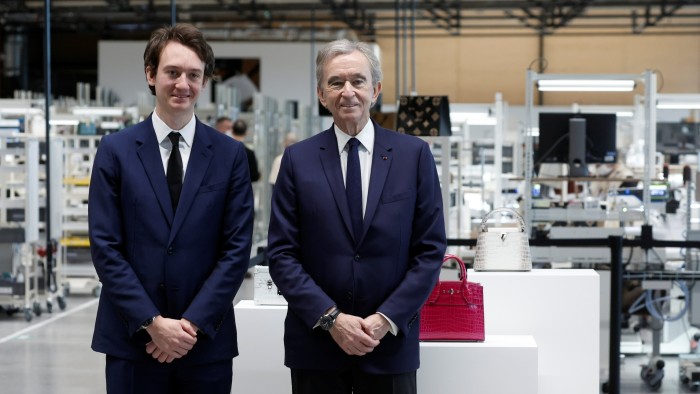Unlock the Editor’s Digest for free
Roula Khalaf, Editor of the FT, selects her favourite stories in this weekly newsletter.
Bernard Arnault’s son Frédéric will leave his role as chief executive of LVMH’s watches division just over a year into the job, the latest in a series of moves within the French luxury group’s controlling family as the younger generation steps up.
The change comes weeks after LVMH announced that 30-year-old Frédéric, the second-youngest child of billionaire Bernard Arnault’s five children, would take over in June as CEO of cashmere specialist Loro Piana. The position will be his first in LVMH’s fashion and leather goods division, the €294bn group’s largest by profit and revenue.
Loro Piana, whose ready-to-wear coats sell for €16,000 or more, is one of LVMH’s few fashion brands that are growing steadily. With revenues of about €3bn last year, according to people familiar with the business, its timeless, high-end positioning has helped it withstand a wider slowdown in the luxury market.
Succession is closely watched at the world’s biggest luxury group, whose other brands include Dior, Louis Vuitton and Tiffany, as Arnault’s children take on more prominent operational roles within the group and an old guard of executives steps aside.
However, no concrete decisions are expected soon, with 76-year-old Arnault set to extend the age limit for the CEO role from 80 to 85 at the group’s annual meeting in April. The Arnault family controls just under 65 per cent of voting rights at LVMH.
Succession is “still a work in progress”, according to Luca Solca, analyst at Bernstein. “There is a sense that Arnault is carrying out survival of the fittest, and at the end he will decide who is left and might be best suited to succeed him.”
Arnault is known as an exacting manager, deeply involved in the day-to-day workings of the company and often spending Saturdays visiting and inspecting stores throughout his empire.
His eldest children, Delphine and Antoine Arnault, have been in prominent positions within the group for some time. Delphine, 49, is chief executive of LVMH’s second-biggest brand, Dior, as well as being a member of the group’s executive committee. Antoine, 47, is in charge of image and sustainability across LVMH and also manages one of the holding companies through which the family controls the group.
Now the younger children are moving rapidly up the ranks.
Alexandre Arnault, 32, newly appointed to lead LVMH’s €6bn wine and spirits division, and Frédéric both joined the LVMH board alongside Delphine and Antoine in April last year. Alexandre, who until this year was a senior executive at US jeweller Tiffany, was put forward on Thursday for a board seat at luxury Italian outerwear group Moncler, in which LVMH has invested.
Only Jean Arnault, the youngest of Bernard’s five children, does not yet have a board seat.
Both Frédéric and Alexandre are “competitive and want to play a role in succession”, said one person close to the group. “Frédéric is now at the head of a prestigious brand, while Alexandre is running a portfolio” at drinks division Moët Hennessy.
However, the changes come at a challenging time for the global luxury market, with demand markedly cooler since the heady days of the pandemic luxury boom, particularly in China where worries about the economy are weighing down on spending.
The US was supposed to be luxury’s growth engine under President Donald Trump as investors anticipated rapid deregulation. The Arnaults have assiduously developed personal relationships with the president — Bernard, Delphine and Alexandre all attended his inauguration in January.
But less than three months into Trump’s second term, the S&P 500 is down more than 5 per cent as investors balk at a raft of tariffs on allies and rivals alike.
The luxury industry — which is a net exporter to the US and has very little manufacturing in the country — had anticipated it would be exempt from tariffs as the Arnaults and their competitors worked their connections within the administration.
But Trump’s threat to impose 200 per cent levies on imports of European alcohol would be a blow to premium drinks makers such as Moët Hennessy, whose business was already struggling in the US in recent years, and show how hard it is to predict the president’s next moves as relations with Europe deteriorate.
Read the full article here

